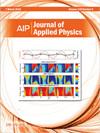Neutron-producing gas puff Z-pinch experiments on a fast, low-impedance, 0.5 MA linear transformer driver
IF 2.5
3区 物理与天体物理
Q2 PHYSICS, APPLIED
引用次数: 0
Abstract
A study on the neutron production from single and double gas puff Z-pinches on the CESZAR linear transformer driver with ∼0.45 MA current and 170 ns rise time is presented. Total neutron yield measurements made with a LaBr activation detector are compared for three configurations, using a double nozzle setup. When a single, hollow, deuterium gas shell was used, reliable implosions could only be attained at higher load mass than the optimal value to match implosion time with the driver rise time, with neutron yields of ∼106 per pulse. The use of a double gas puff configuration with a deuterium center jet allowed a reduction in the shell density and operation closer to machine-matched conditions, recording up to (4.1 ± 0.3) × 107 neutrons/pulse when either Kr or D2 was used in the shell. For a comparable mass and implosion time, using a higher atomic-number gas in the outer shell results in more unstable plasma surface and smaller plasma radius at the location of instability bubbles, which, however, do not seem to consistently correlate with a higher neutron yield. Comparing implosion dynamics with models and neutron yields with literature scaling suggests that the machine current is not well coupled to the plasma during the final stages of compression. Optimizing current and energy coupling to the pinched plasma is critical to improving performance, particularly in low-impedance drivers.在快速、低阻抗、0.5 MA 线性变压器驱动器上进行中子产生气体噗嗤 Z-pinch 实验
本研究介绍了在 CESZAR 线性变压器驱动器上使用 0.45 MA 电流和 170 ns 上升时间的单气体喷嘴和双气体喷嘴 Z 形针产生中子的情况。使用双喷嘴设置,比较了用 LaBr 激活探测器对三种配置进行的总中子产率测量。当使用单个空心氘气壳时,只有在负载质量高于使内爆时间与驱动器上升时间相匹配的最佳值时,才能实现可靠的内爆,每个脉冲的中子产率为~106。使用带有氘中心射流的双气蓬配置可以降低外壳密度,使运行更接近于机器匹配条件,在外壳中使用 Kr 或 D2 时,每脉冲可记录多达 (4.1 ± 0.3) × 107 个中子。在质量和内爆时间相当的情况下,在外壳中使用原子序数更高的气体会导致更不稳定的等离子体表面和不稳定气泡位置处更小的等离子体半径,但这似乎与更高的中子产率并不一致。将内爆动力学与模型进行比较,将中子产率与文献比例进行比较,表明在压缩的最后阶段,机器电流与等离子体的耦合并不理想。优化与挤压等离子体的电流和能量耦合对提高性能至关重要,特别是在低阻抗驱动器中。
本文章由计算机程序翻译,如有差异,请以英文原文为准。
求助全文
约1分钟内获得全文
求助全文
来源期刊

Journal of Applied Physics
物理-物理:应用
CiteScore
5.40
自引率
9.40%
发文量
1534
审稿时长
2.3 months
期刊介绍:
The Journal of Applied Physics (JAP) is an influential international journal publishing significant new experimental and theoretical results of applied physics research.
Topics covered in JAP are diverse and reflect the most current applied physics research, including:
Dielectrics, ferroelectrics, and multiferroics-
Electrical discharges, plasmas, and plasma-surface interactions-
Emerging, interdisciplinary, and other fields of applied physics-
Magnetism, spintronics, and superconductivity-
Organic-Inorganic systems, including organic electronics-
Photonics, plasmonics, photovoltaics, lasers, optical materials, and phenomena-
Physics of devices and sensors-
Physics of materials, including electrical, thermal, mechanical and other properties-
Physics of matter under extreme conditions-
Physics of nanoscale and low-dimensional systems, including atomic and quantum phenomena-
Physics of semiconductors-
Soft matter, fluids, and biophysics-
Thin films, interfaces, and surfaces
 求助内容:
求助内容: 应助结果提醒方式:
应助结果提醒方式:


